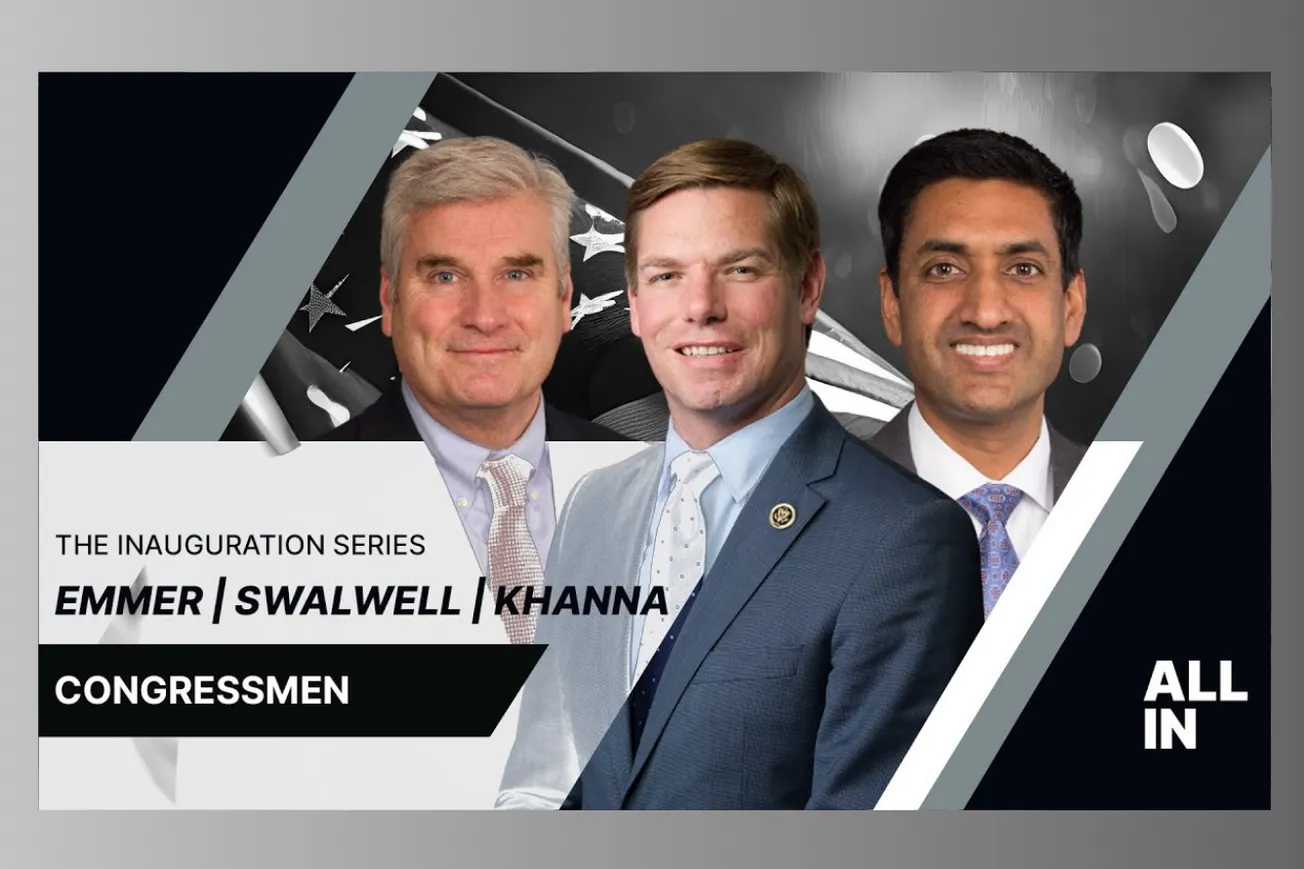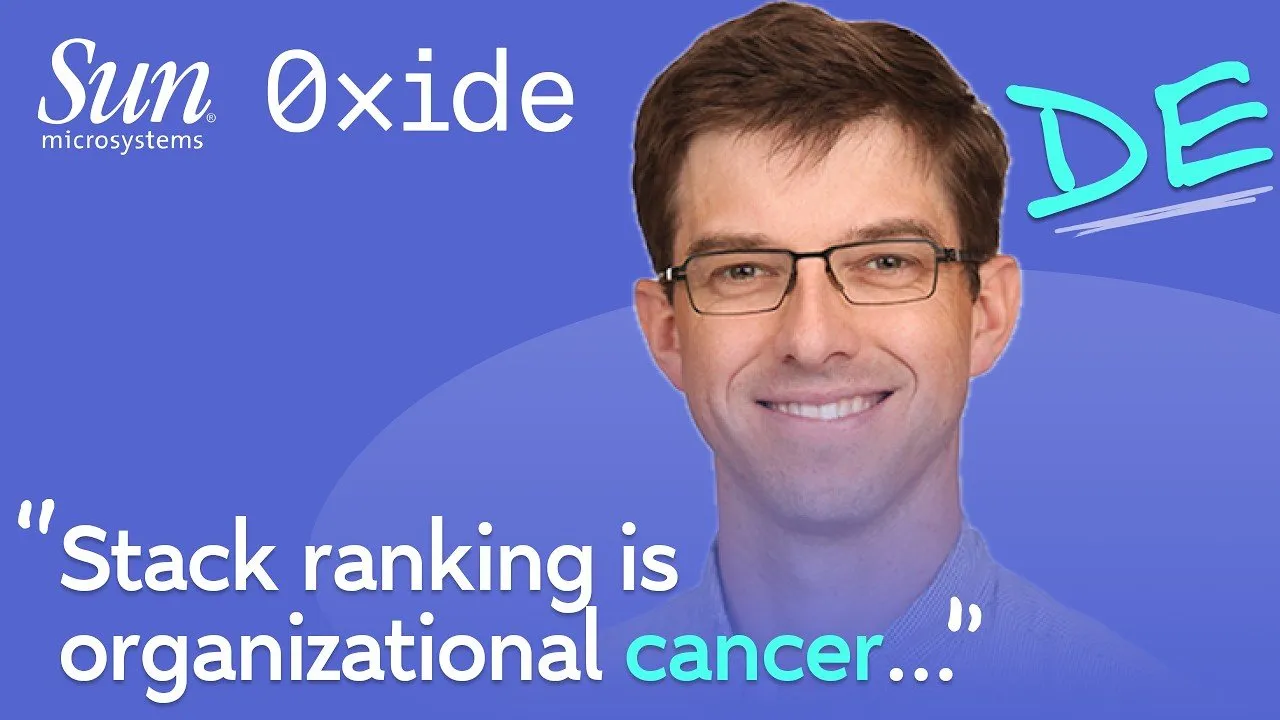Table of Contents
Three congressional representatives reveal stark party dynamics as Democrats grapple with electoral losses while Republicans advance unified agenda through DOGE, immigration enforcement, and fiscal reforms.
House Whip Tom Emmer, Rep. Eric Swalwell, and Rep. Ro Khanna provide insider perspectives on Democratic party identity crisis, bipartisan government efficiency opportunities, and evolving positions on immigration, TikTok, and California governance challenges.
Key Takeaways
- Democratic party faces identity crisis after electoral defeat, with leadership accused of orchestrating "conspiracy" rather than coverup regarding Biden's cognitive decline
- House Republicans plan aggressive $5-7 trillion spending cut agenda through reconciliation process targeting Memorial Day 2025 deadline
- Bipartisan support emerges for DOGE government efficiency initiatives, with Democrats willing to collaborate on defense procurement reform and bureaucratic streamlining
- TikTok ban divides Democrats internally, with representatives split between national security concerns and free speech principles
- Immigration enforcement strategy focuses on violent criminals first, but 15-million deportation scope remains politically contentious across party lines
- California wildfires create political opportunity for moderate Democrats advocating pragmatic governance over progressive ideology
- Cryptocurrency regulation gains Republican support while Democrats remain cautious about retail investor protection and foreign influence concerns
- Social Security reform requires voluntary privatization options and strategic timing after economic credibility establishment
Timeline Overview
- 00:00–28:15 — Tom Emmer on Democratic Party Dysfunction: Analysis of Biden cognitive decline conspiracy versus coverup, Democratic leadership coup against Biden, kamala Harris coronation process, and Republican bottom-up versus Democratic top-down party structures
- 28:15–52:40 — Republican Fiscal Strategy and DOGE Implementation: $5-7 trillion spending cut targets, reconciliation timeline through Memorial Day, Social Security voluntary privatization, cryptocurrency regulation approach, and immigration enforcement priorities versus economic impact
- 52:40–78:50 — Eric Swalwell on Democratic Rebranding Crisis: Party identity problems, entrepreneurship alienation, wokeism perception issues, cabinet confirmation analysis, TikTok ban security concerns, and border policy nuanced positions
- 78:50–102:30 — Swalwell on Trump Investigations and California Governance: Russia investigation retrospective, prosecutorial standards application, California wildfire response criticism, and pragmatic governance demands
- 102:30–125:45 — Ro Khanna on Economic Vision and Party Reform: Government investment versus free market approaches, DOGE collaboration opportunities, nuclear energy regulatory barriers, defense procurement competition, and California moderate resurgence trends
Democratic Party Identity Crisis: Leadership Conspiracy Exposed
Tom Emmer's analysis reveals fundamental structural problems within Democratic party leadership that extend beyond typical electoral defeats. His distinction between "coverup" and "conspiracy" regarding Biden's cognitive decline provides crucial insight into party dynamics.
- Democratic leadership orchestrated systematic conspiracy to conceal Biden's diminishing capacity rather than simple media coverup, with mainstream media complicity throughout four-year decline period
- Kamala Harris installation occurred through "back room coup" that circumvented democratic primary processes and ballot access requirements, demonstrating top-down party control mechanisms
- Bernie Sanders' 2020 campaign termination illustrates coordinated establishment intervention, with candidates like Amy Klobuchar simultaneously withdrawing to consolidate behind Biden on cue
- Republican party operates through bottom-up processes where Trump's 77 million votes provided genuine mandate, contrasting with Democratic superdelegates and consultant-driven decision making
- Identity politics strategy backfired catastrophically, with anti-Semitic comments from progressive wing creating internal divisions that moderate Democrats cannot effectively counter
- Party lacks coherent brand identity and struggles with messaging on issues like transgender sports participation that alienate mainstream voters across demographic groups
Emmer's assessment suggests Democrats face existential rather than tactical challenges. The party's inability to conduct authentic primary processes while managing ideological extremes indicates deeper institutional problems that transcend campaign strategy failures.
Republican Fiscal Reform: Aggressive Spending Cut Timeline
House Republicans under Trump's second term plan unprecedented fiscal reforms targeting $5-7 trillion in spending reductions over ten years through aggressive reconciliation tactics and systematic program elimination.
- Budget resolution deadline set for first week of February 2025, with reconciliation process completion targeted for Memorial Day weekend through compressed legislative timeline
- Twelve appropriation subcommittees receive specific reduction allotments after Senate pre-negotiation, allowing systematic spending cut implementation across government departments
- Trump tax cuts extension provides foundation for broader tax reform while reconciliation process enables deficit reduction without Democratic cooperation requirements
- Social Security reform requires voluntary privatization options for younger Americans within federal parameters, similar to Australian superannuation system but maintaining existing beneficiary promises
- DOGE efficiency initiatives target defense procurement reform, with 56% of federal spending containing systematic waste like $150,000 soap dispensers and $1,000 breast pumps
- Congressional vote-whipping process manages 60% of Republican members who demand participation in legislative development rather than following leadership directives automatically
The ambitious timeline reflects Republican confidence in unified government control while acknowledging that real spending cuts require presidential leadership to overcome bipartisan spending coalition resistance.
Bipartisan DOGE Collaboration: Government Efficiency Consensus
Despite partisan divisions, Democratic representatives express surprising willingness to collaborate with Elon Musk and Vivek Ramaswamy's Department of Government Efficiency on specific bureaucratic reforms.
- Defense procurement system dominated by five prime contractors prevents startup competition and innovation, with Bloomberg's proposed 15% startup allocation gaining Democratic support
- Federal employee office attendance policies receive bipartisan backing, with Democrats acknowledging workplace productivity benefits while maintaining disability accommodation flexibility
- Regulatory streamlining for small business formation aligns with Democratic entrepreneurship goals, particularly in manufacturing and technology sectors requiring government partnership
- Nuclear energy regulatory barriers prevent American competitiveness against Chinese nuclear expansion, with Democrats supporting Gen 4 reactor development and safety modernization
- SpaceX disruption model for Pentagon procurement demonstrates private sector efficiency gains that progressive Democrats can support without abandoning government oversight principles
- Swalwell and Khanna both acknowledge government execution failures require reform regardless of ideological differences about appropriate federal spending levels
This unexpected collaboration opportunity suggests DOGE initiatives might achieve bipartisan support by focusing on operational efficiency rather than ideological program elimination.
TikTok Ban: Security Versus Speech Divide
The TikTok prohibition reveals complex tensions between national security concerns and free speech principles, with Democrats internally divided despite unanimous Supreme Court support for congressional action.
- Swalwell supports ban based on Chinese Communist Party ownership and potential algorithm manipulation affecting 170 million Americans, emphasizing scale differentials from other security-compromised applications
- Khanna opposes ban citing free speech traditions and economic impact on content creators earning substantial income through platform monetization, preferring data protection legislation approach
- Technical security vulnerabilities extend beyond TikTok to Chinese-manufactured electronics including USB chargers and drones with embedded hacking capabilities and automatic Wi-Fi connection protocols
- Reciprocity arguments suggest American social media access to Chinese markets could provide alternative framework, though Chinese government control mechanisms prevent meaningful market entry
- Content creator economic dependency creates constituency pressure, with examples like single mothers earning $60-70,000 annually through personal storytelling and community building
- Intelligence committee access to classified briefings fails to convince Democrats like Swalwell and ranking member Jim Himes that national security justifies platform elimination
The divide reflects broader questions about government authority to regulate speech platforms based on foreign ownership concerns versus market-based solutions for data protection.
Immigration Enforcement: Criminal Priority Consensus
Both parties agree on prioritizing violent criminal deportation while disagreeing about comprehensive enforcement affecting estimated 15 million undocumented immigrants currently residing in America.
- Emmer supports systematic enforcement of existing immigration law while acknowledging agricultural workforce dependencies require legal pathway reforms rather than continued illegal employment relationships
- Swalwell advocates criminal-focused approach followed by border security improvements, but opposes mass deportation affecting productive community members like dental hygienists with American-born children
- Khanna emphasizes economic benefits of immigration through demand creation and entrepreneurship, citing district demographics where 40% foreign-born residents contribute to eighth-wealthiest congressional district status
- Agricultural sector workforce departure already occurring as workers voluntarily leave anticipating enforcement actions, creating immediate economic disruption in rural communities dependent on immigrant labor
- H-1B visa reform gains bipartisan support through wage floor requirements and job mobility improvements that prevent indentured servitude relationships lasting up to 10 years currently
- Numerical immigration targets remain undefined politically, preventing rational debate about optimal legal immigration levels based on economic conditions and unemployment rates
The lack of specific numerical frameworks perpetuates emotional rather than data-driven immigration discussions that prevent pragmatic policy solutions.
California Governance Crisis: Pragmatic Democrat Resurgence
California wildfires expose governance failures that create political opportunities for moderate Democrats advocating effective administration over progressive ideology priorities.
- Pacific Palisades destruction affecting affluent Democratic constituencies generates demand for competent leadership regardless of ideological alignment, creating opening for business-oriented candidates
- Brush clearing and forest management failures demonstrate environmental ideology conflicts with practical wildfire prevention, requiring policy priority rebalancing toward public safety
- Mayor Karen Bass's absence during crisis while attending Ghana inauguration represents broader pattern of misplaced priorities that moderate Democrats can exploit politically
- Dan Lurie's San Francisco mayoral victory and Matt Mahan's San Jose success indicate voter preference for effective governance over progressive purity testing
- Bob Iger consideration for Los Angeles mayor represents business community engagement in Democratic politics, despite progressive resistance to "oligarch" involvement
- Khanna's potential gubernatorial consideration reflects moderate Democratic positioning for statewide office as party seeks credible alternatives to progressive governance failures
These developments suggest California Democratic party evolution toward pragmatic centrism driven by governance crisis rather than ideological conversion.
Common Questions
Q: What makes the Democratic party's Biden situation a conspiracy rather than a coverup?
A: Emmer argues everyone in Washington observed Biden's decline over four years, making it systematic concealment rather than hidden information discovery.
Q: Can Republicans realistically cut $5-7 trillion in federal spending over ten years?
A: House leadership has identified specific targets but requires presidential leadership to overcome bipartisan spending coalition resistance in Congress.
Q: Why do some Democrats support DOGE despite opposing Trump's agenda?
A: Government efficiency initiatives like defense procurement reform align with progressive goals for reducing waste and increasing competition.
Q: How do national security and free speech concerns balance regarding TikTok?
A: Representatives disagree whether Chinese government ownership creates sufficient security risk to justify banning platform used by 170 million Americans.
Q: What happens if agricultural workforce continues departing before deportation policies begin?
A: Economic disruption already occurring as workers voluntarily leave, requiring legal immigration pathway reforms to address workforce shortages.
The interviews reveal how electoral defeat forces Democratic introspection while Republican unity enables aggressive policy implementation. Bipartisan collaboration opportunities exist around government efficiency and immigration reform, but fundamental disagreements about federal spending levels and enforcement priorities persist. California's governance crisis provides laboratory for testing whether moderate Democratic approaches can regain voter confidence in blue-state management capabilities.
Practical Implications
- Democratic party requires fundamental restructuring — Electoral defeat necessitates leadership changes and ideological repositioning away from progressive orthodoxy toward pragmatic governance approaches
- Reconciliation process enables rapid Republican policy implementation — Unified government control allows systematic spending cuts and tax reforms without Democratic cooperation requirements
- DOGE creates bipartisan collaboration opportunities — Government efficiency initiatives around defense procurement and regulatory streamlining can attract Democratic support focused on operational improvements
- TikTok ban reflects broader technology sovereignty challenges — Foreign-controlled platforms and devices create security vulnerabilities requiring comprehensive data protection legislation beyond single-app prohibition
- Immigration enforcement requires workforce transition planning — Mass deportation attempts will create agricultural and service sector disruptions requiring legal pathway alternatives and economic impact mitigation
- California wildfires accelerate moderate Democratic positioning — Governance failures create electoral opportunities for business-oriented Democrats emphasizing competence over ideological purity
- Cryptocurrency regulation needs retail investor protection — Republican enthusiasm for digital assets requires consumer safeguards and foreign influence controls to prevent retail exploitation
- Social Security reform timing depends on economic credibility — Voluntary privatization options require demonstrated success on border security and inflation control before public trust enables major program changes
The political realignment continues as both parties adapt to changing voter preferences and governance challenges revealed through crisis management failures.





